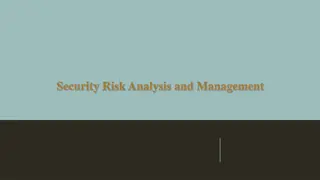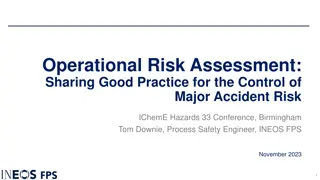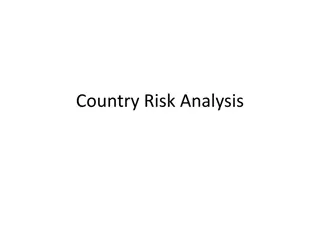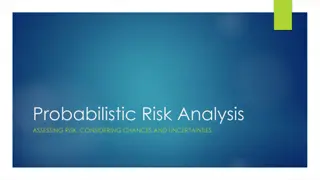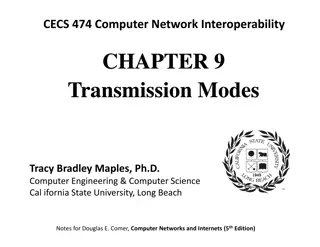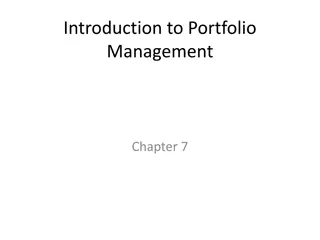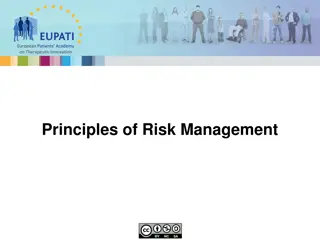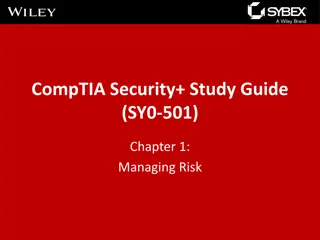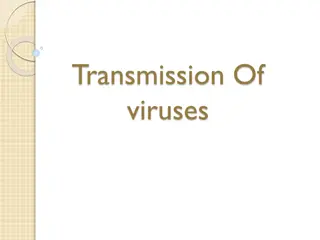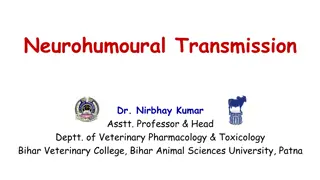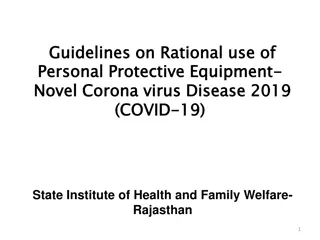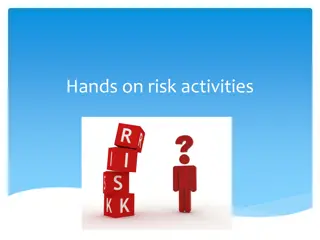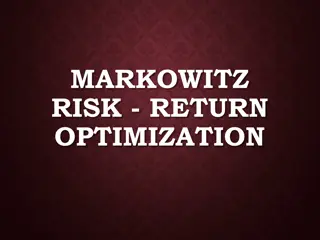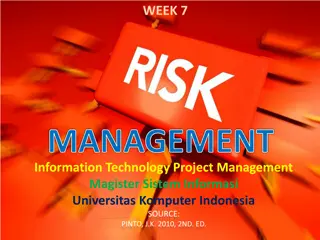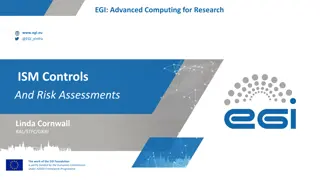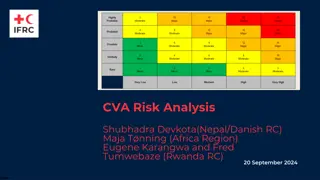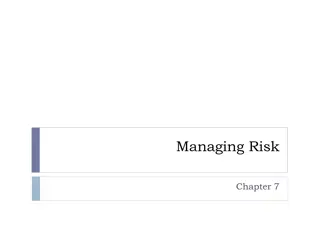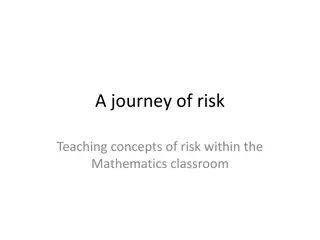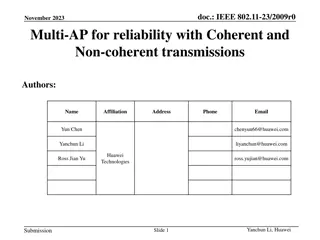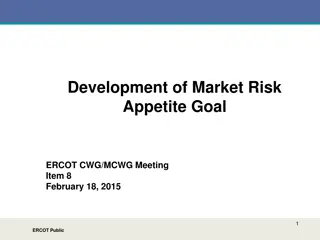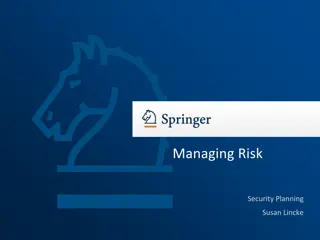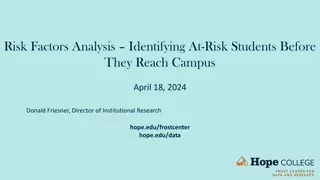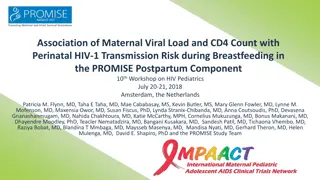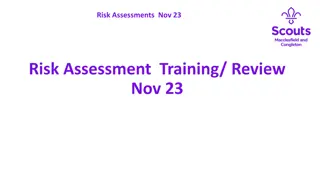Comprehensive Overview of Security Risk Analysis and Management
Explore the essential aspects of security risk analysis and management, including risk identification, assessment, and control techniques within an Information Security (InfoSec) context. Learn about the purpose of risk management, steps involved in a risk management plan, asset identification and c
0 views • 22 slides
Understanding Risk Management in Environmental Geography and Disaster Management
Risk management in environmental geography and disaster management involves assessing the potential losses from hazards, evaluating vulnerability and exposure, and implementing strategies to mitigate risks. It includes calculating risk, dealing with risk through acceptance, avoidance, reduction, or
1 views • 10 slides
Introduction to Flood Risk Assessment with HEC-FDA Overview
This presentation delves into flood risk assessment using HEC-FDA software, covering topics such as defining flood risk, components of uncertainty, consequences of flood risk, and methods to assess flood risk including hydrology, hydraulics, geotechnical, and economics. It explores the intersection
6 views • 39 slides
TELECOMMUNICATIONS MEDIA
Telecommunications is the electronic transmission of information over distances, including voice calls, data, text, images, and video. It encompasses a range of technologies like fiber optics, satellites, telephones, and the Internet. Components of a telecommunications network include terminals, int
5 views • 13 slides
Operational Risk Assessment for Major Accident Control: Insights from IChemE Hazards 33 Conference
This content provides valuable insights into the importance of Operational Risk Assessment (ORA) in managing major accident risks in high hazard industries. It covers the necessity of ORA, identifying changes, risk assessment, and key success factors. Real-life examples like the Buncefield Terminal
0 views • 22 slides
Understanding Agricultural Risk Management in the Face of Natural Disasters
Exploring the impact of natural disasters on agricultural economics, this content delves into the challenges faced by farmers and the approaches available for managing risks. From analyzing the Billion-Dollar Disasters in the US to discussing private and public risk management provisions, the conten
3 views • 20 slides
Understanding Country Risk Analysis in International Business
Country risk analysis is crucial for multinational corporations (MNCs) to assess the potential impact of a country's environment on their financial outcomes. It includes evaluations of political and economic risks in foreign operations. Sovereign risk, political risk characteristics, and factors are
0 views • 61 slides
Enhancing Zoonotic Disease Risk Communication in Public Health Emergencies
Explore the significance of adopting a One Health approach to zoonotic disease risk assessment and communication in the context of emergency health situations. The session emphasizes core capacities required by the International Health Regulations (IHR) 2005, effective risk communication processes,
2 views • 13 slides
Understanding Probabilistic Risk Analysis: Assessing Risk and Uncertainties
Probabilistic Risk Analysis (PRA) involves evaluating risk by considering probabilities and uncertainties. It assesses the likelihood of hazards occurring using reliable data sources. Risk is the probability of a hazard happening, which cannot be precisely determined due to uncertainties. PRA incorp
1 views • 12 slides
Understanding Performance of Transmission Lines in Electrical Engineering
The performance of a transmission line in power systems is critical for efficient operation. Factors such as voltage drop, line losses, and transmission efficiency are key considerations in design and operation. The line parameters of resistance, inductance, capacitance, and shunt conductance play c
2 views • 26 slides
Understanding Transmission Modes in Computer Networks
Transmission modes in computer networks can be divided into serial and parallel modes. Parallel transmission allows multiple bits to be sent simultaneously over separate media, while serial transmission sends one bit at a time. The choice between serial and parallel transmission depends on factors s
0 views • 13 slides
Project Risk Management Fundamentals: A Comprehensive Overview
Project risk management involves minimizing potential risks and maximizing opportunities through processes such as risk management planning, risk identification, qualitative and quantitative risk analysis, risk response planning, and risk monitoring and control. Quantitative risk analysis assesses t
0 views • 41 slides
Fundamentals of Portfolio Management and Risk Aversion in Investing
Portfolio theory is based on the principles of maximizing returns for a given risk level, considering all assets owned. Investors typically exhibit risk aversion, preferring lower risk assets for similar returns. Risk is defined as future outcome uncertainty. Markowitz Portfolio Theory highlights th
1 views • 17 slides
Principles of Risk Management in Therapeutic Innovation
European Patients Academy emphasizes the importance of risk management in therapeutic innovation. Understanding the balance between benefits and risks, implementing risk management strategies for all medicines, and identifying different types of risks are crucial for ensuring patient safety and publ
0 views • 13 slides
Risk Management Strategies in Organizational Security
Exploring risk management in organizational security, this study guide delves into resiliency, automation strategies, policies, and procedures to reduce risk. It covers threat assessments, computing risk assessments, qualitative vs. quantitative risk measurements, and actions based on risk assessmen
1 views • 19 slides
Understanding the Transmission of Viruses: Routes and Implications
Viruses are intracellular parasites that require transmission to a new host to evade immune responses. This transmission process, whether through respiratory droplets, fecal-oral routes, or sexual contact, is crucial in the viral life cycle. Different modes of transmission, such as horizontal and ve
0 views • 11 slides
Understanding Neurohumoural Transmission in Veterinary Pharmacology
Neurohumoural transmission in the field of veterinary pharmacology involves the communication of nerve messages through the release of chemical messengers. This process includes axonal conduction and junctional transmission. The historical aspects of neurohumoural transmission highlight key discover
5 views • 11 slides
Guidelines on Rational Use of Personal Protective Equipment for COVID-19
Healthcare workers caring for COVID-19 patients need to use Personal Protective Equipment (PPE) appropriately to protect themselves and prevent transmission. This includes proper selection, training on how to use, dispose of PPE, and reduce the risk of pathogen transmission. The outbreak of COVID-19
0 views • 26 slides
Understanding Risk: Definitions and Concepts Explored
Delve into the world of risk with definitions ranging from baseline and absolute risk to relative risk, providing insights into how we perceive and manage uncertainties in various aspects of life. Explore the nuances of risk through engaging activities and gain a deeper understanding of statistical
0 views • 22 slides
Understanding Markowitz Risk-Return Optimization
Modern portfolio theory, introduced by Harry Markowitz, aims to maximize expected return while managing risk. Efficient portfolios are represented by points on the efficient frontier, diversifying investments for optimal risk-return trade-offs. The risk-expected return relationship is depicted graph
0 views • 16 slides
Understanding Risk Concepts and Management Strategies in Finance
Explore the essential concepts of risk in finance, such as risk definition, risk profiles, financial exposure, and types of financial risks. Learn about risk vs. reward trade-offs, identifying risk profiles, and tools to control financial risk. Understand the balance between risk and return, and the
0 views • 18 slides
Risk Management in Information Technology Project
Project risk is any potential event that can harm a project's success. Risk management involves identifying, analyzing, and responding to risks throughout the project's lifecycle to safeguard its objectives. The process includes risk identification, analysis of probability and consequences, risk mit
0 views • 16 slides
Risk and Return Assessment in Financial Management
This comprehensive presentation explores the intricacies of risk and return assessment in the realm of financial management. Delve into understanding risk concepts, measuring risk and return, major risk categories, and the impact of risk aversion on investment decisions. Gain insights into the manag
0 views • 62 slides
Risk Management and Security Controls in Research Computing
The European Grid Infrastructure (EGI) Foundation conducts risk assessments and implements security controls in collaboration with the EOSC-hub project. The risk assessments involve evaluating threats, determining likelihood and impact, and recommending treatment for high-risk threats. Results from
0 views • 13 slides
Risk Management & MPTF Portfolio Analysis at Programme Level for UN Somalia
This session delves into the world of risk management and portfolio analysis at the programme/project level, specifically focusing on the Risk Management Unit of the United Nations Somalia. It covers enterprise risk management standards, planned risk management actions, the role of RMU, joint risk m
0 views • 30 slides
Comprehensive CVA Risk Analysis and Management Overview
This detailed document delves into the importance of CVA Risk Analysis, introducing the CVA risk register and outlining the identification, mitigation, and management of risks. It emphasizes understanding root causes and gaining confidence in filling the Risk Register. Additionally, it discusses the
0 views • 12 slides
Managing Project Risk to Reduce Construction Claims
Construction projects face risks such as escalating costs, incomplete plans, and design issues. Managing project risk is crucial to avoid adverse impacts and maximize opportunities for successful project outcomes. This presentation by Laurie Dennis covers the definition of project risk, importance o
0 views • 26 slides
Alcohol and Cancer Risk: Understanding the Links
Alcohol consumption is linked to an increased risk of various cancers, including mouth, throat, esophagus, breast, liver, and colorectal cancers. Factors such as ethanol, acetaldehyde, nutrient absorption, estrogen levels, and liver cirrhosis play a role in this risk. Even light drinking can elevate
0 views • 17 slides
Comprehensive Guide to Risk Management Processes
Explore the essential aspects of risk management in Chapter 7, covering the risk management process, benefits, risk event graph, and step-by-step procedures for risk identification and assessment. Learn how proactive risk management reduces surprises, enhances control, and improves project performan
0 views • 38 slides
Understanding Risk Concepts in the Mathematics Classroom
Risk is a concept integral to decision-making in various aspects of life. This resource explores how risk is defined in the real world, its relevance in the classroom, and strategies for teaching risk literacy to students. It delves into the multiple definitions of risk, risk analysis, and the emoti
0 views • 62 slides
Multi-AP for Reliable Wireless Transmission with Coherent and Non-coherent Technology
In this IEEE 802.11-23/2009r0 document, the concept of Multi-AP coordination is discussed to achieve Ultra High-reliability (UHR) goals. The use of both Coherent Joint Transmission (JT) and Non-coherent transmission technologies is explored for improved reliability and performance in wireless commun
0 views • 16 slides
SMMPA Annual Meeting Transmission Rate Update 2018
SMMPA, a not-for-profit political subdivision in Minnesota, updated its transmission rate formula in August 2018. The Attachment O timeline outlines crucial dates for stakeholders, including the annual meeting on formula rate updates. SMMPA, as a Transmission Owner in MISO, follows FERC-approved tem
0 views • 8 slides
Proposed Amendments to GRIDCO Regulations for Transmission Charges
The proposed amendments to the CERC regulations aim to alleviate the burden of transmission charges on GRIDCO and consumers in Odisha. The amendments focus on the sharing of inter-state transmission charges and losses, including the substitution of LTA/MTOA with GNA for sharing transmission charges.
0 views • 7 slides
Understanding Organizational Risk Appetite and Tolerance
Explore the development of market risk appetite goals and how to define and establish organizational risk tolerance. Learn about the Classic Simplified View of Risk Tolerance and different methods to determine risk appetite. Discover the importance of assessing market risk impact and aligning risk t
0 views • 8 slides
Developing a Risk Appetite Culture: Importance and Framework
Risk management plays a critical role in the success of corporations, with strategy and risk being intertwined. This presentation delves into definitions of key terms such as risk appetite, the Risk Appetite Cycle, characteristics of a well-defined risk appetite, and the importance of expressing ris
0 views • 31 slides
Security Planning and Risk Management Overview
This content provides an in-depth exploration of managing risk, security planning, and risk appetite in the context of cybersecurity. It covers essential concepts such as risk management process, threat types, risk analysis strategies, vulnerability assessment, and risk mitigation techniques. The ma
0 views • 73 slides
Risk Factors Analysis: Identifying At-Risk Students Before They Reach Campus
Risk Factors Analysis aims to identify students at risk of attrition before they even arrive on campus by evaluating academic, financial, minority, and first-generation factors. The method involves choosing specific risk factors, tracking historical prevalence, calculating relative risk, and predict
0 views • 15 slides
Association of Maternal Viral Load and CD4 Count with Perinatal HIV-1 Transmission Risk
Increased maternal viral load (MVL) and decreased CD4 cell counts have been linked to higher risks of perinatal and postnatal HIV-1 transmission during breastfeeding. The PROMISE Postpartum Component study examines the association between these factors and transmission risk, providing insights into
0 views • 15 slides
Breaking Barriers: Understanding U=U in HIV Prevention
The concept of Undetectable=Untransmittable (U=U) has reshaped how we approach HIV prevention, with evidence emphasizing viral load as a key factor in transmission risk. Landmark studies like the Partner Study and HPTN 052 have solidified the U=U message, showcasing significant reductions in HIV tra
0 views • 28 slides
Comprehensive Risk Assessment Training Overview
In this risk assessment training session held on November 23, participants reviewed the process of writing and reviewing risk assessments to enhance the quality of assessments for safer scouting experiences. The training aimed to improve leaders' skills and confidence in risk assessment practices wh
0 views • 37 slides
